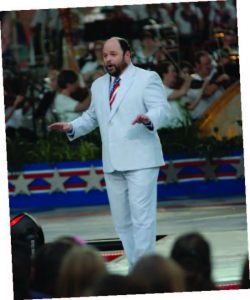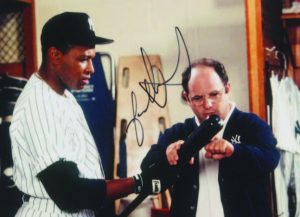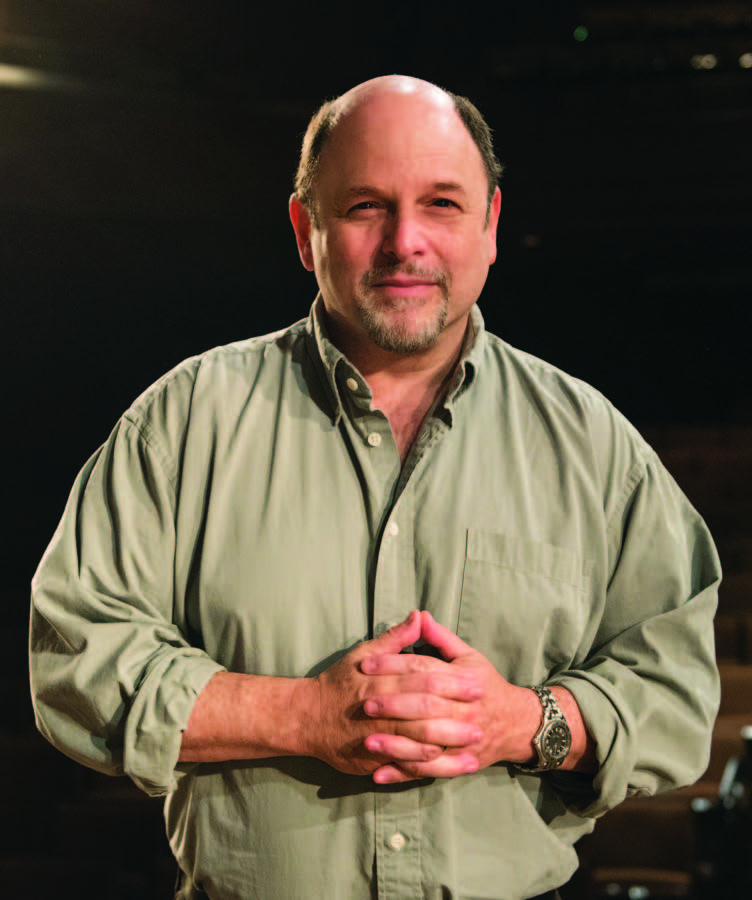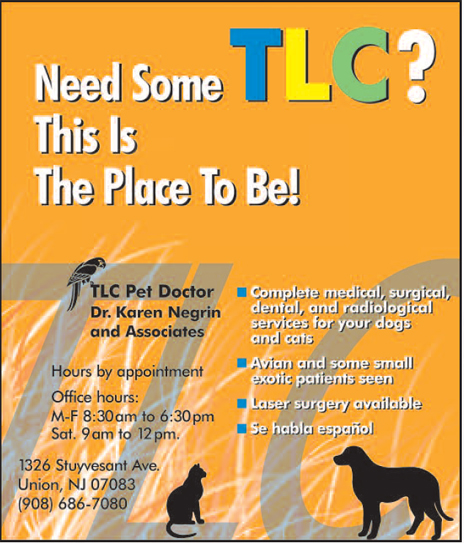At a time when everyone in New Jersey needs a good laugh, we couldn’t think of a better go-to guy than Jason Alexander. From his New Jersey roots to his magnificent run on Seinfeld, he embodies the kind of honesty, vulnerability and humor that are the foundation of great entertainment. Gerry Strauss asked Jason about the myriad stops on his show business journey, and where he hopes to go from here. We think his answers will make you smile.
EDGE: What do you think it was about growing up in New Jersey that helped set you up for success?
JA: There are probably two things I could point to. One is sort of general and one is specific to where I grew up in Jersey. What I’ve found as I travel across the country and around the world is that places have a kind of a rhythm and a music to them. New York has an accent. New York has a rhythm. LA has an accent. LA has a rhythm. You can say the same about many places throughout the South or in New England. Jersey actually does have a kind of a distinct music to the accent, and a rhythm that you don’t really find other places. It’s not quite as pugnacious as New York. Not quite as tough. But there’s a certain kind of a bravura to Jersey.

Boboroshi – John Athayde
EDGE: And a sense of humor…
JA: It’s self-deprecating, and we sort of taunt each other on what could be soft spots, but it’s all done with love and affection. Nothing really has a malicious intent. So there was this sense of humor and attitude about Jersey that I think I was steeped in growing up—and that in some ways informed a lot of some of the early characters that I was asked to do. It wasn’t honest, because if people really knew me, they knew that I was kind of a shy, intimidated kid, but I had a cover for it that had a kind of a Jersey swagger to it. And so people who didn’t know me well thought that I came off as not only rock-confident, but somehow cocky. I think initially that gave people a sense of confidence about hiring me that was totally disproportionate to my ability [laughs]. I think it was all just swag. So, I think that may have served me well.
EDGE: Your move from Maplewood to Livingston was a game-changer, too.
JA: I was 12. In the initiation process of being a new kid in a new town, the first kids that picked me up were these theater kids, because Livingston had this really active financial and community support for the arts. There was an organization called the Livingston Teen Theater. It was not affiliated with any of the schools. And just like a sports team, it was financed by the community and it was given resources by the community, and that was my entree into the theater. Those kids, that organization—the first two or three shows I ever did in my life—was right there in Livingston, through the auspices of that teen theater. Those kids became my friends. They became my community. And with those kids, I began going to the theater in New York and seeing what the mecca of American theater could offer and getting inspired by that and eventually aspiring to that.
EDGE: Did you start with the distinct focus on making it as a stage actor?
JA: When I was a kid standing in my living room holding the hairbrush and accepting it as the award, it was always the Tony award. It was not an Oscar or an Emmy. So, my focus was really on how great it would be to be able to have a career in the Broadway theater, if that was possible for me. The truth is, my first professional jobs were in front of cameras. I got into my first acting union by doing a pilot for a children’s musical theater sort-of television show idea, and then my first professional jobs after that were television commercials. So I was professionally performing in front of cameras before I was professionally performing in front of audiences. But I was always into the theater, and then everything else that happened was a happy accident. I did think I was going to be more of a dramatic actor than a comedic actor. I don’t know why I thought that…I guess because I didn’t think of myself as particularly funny, and I was impressed with actors that seemed to have this great command and power on stage. I thought I could emulate that. Because I was delusional—I didn’t look in a lot of mirrors when I was a young man. I didn’t see that I was five-foot-five and 30 pounds overweight and already balding at the age of 18. So, it had to be pointed out to me later in college, and I started to understand perhaps comedy might have more opportunity for me.
EDGE: Who inspired you during those formative years?
JA: They were an odd group of actors. I became interested in acting at first by becoming a Star Trek fan and being completely smitten with Bill Shatner as Kirk. That over-the-top, large, hyper-masculine, hyper-theatrical approach was something that really appealed to me. I started going into New York to watch theater with these kids I was doing teen theater with. One of the earliest shows that we saw was a matinee of the original production of Pippin. Ben Vereen came on that stage and he was so charismatic and so mysterious and so powerful and magical that I thought, “Oh, wow. That’s the kind of musical work I’d like to be able to do.” I remember seeing James Earl Jones do King Lear in Central Park, and that was burned into my brain as one of the great performances. So, there were those kinds of actors that I wanted to emulate and then aspire to.
EDGE: So with this intense focus on stage acting, what actually led you to television, and then landing on Seinfeld?
JA: Like most actors, you get led by the nose of opportunity. I never made any hard-and-fast rule about doing or not doing film or television—or anything else that came along. I was a young guy, a working actor, and just about any opportunity to make a living was okay by me. I was very fortunate in that a lot of the stuff that came my way, even if it wasn’t the most successful projects in the world, I got to work with extraordinary people. So, take my first Broadway role. Merrily We Roll Along was not a successful production, but it’s Hal Prince and Stephen Sondheim and George Firth and Paul Gemignani and Ron Field—extraordinary, extraordinary people to be tutored by. I had the ability to learn from Neil Simon and from Jerome Robbins. So, that was just very fortunate. But that turn to television and film, to the extent that it happened, was never something I could plan. There’s a casting director in town, they saw you on stage, they think you might be viable. You go in, you meet a director or you put something down on tape and the dice roll. With Seinfeld, there was no magic formula. It wasn’t through connections that I’m aware of. It was literally that they had seen a ton of people in LA, they hadn’t found anyone that they quite clicked with, for whatever reason. They called a New York casting director who knew me and said, “This is the kind of guy we think we’re looking for. Put twenty actors on tape.” And I was one of the twenty guys. If she hadn’t thought of me, my guess is that I wouldn’t have been part of Seinfeld. So, it’s all just happy circumstance, until you start getting to a point where you can kind of guide or nurture your own choices.

Upper Case Editorial
EDGE: Not a lot of actors have that freedom.
JA: I think there’s only about forty of them in Hollywood who are picking and choosing what they’re going to do next—and then actually get it done. So, you’re a leaf in the wind and you’re constantly casting yourself out there and hoping somebody will pick you up, and whatever medium it’s in is fine. If it’s good people and a worthwhile project, you go forward and then you see how fortune treats it.
EDGE: Since Seinfeld was taped live in front of an audience, did you look at it as a form of theater?
JA: Very much. Yeah, absolutely. Multi-cam sitcom is closer to theater than it is to other kinds of television or film. In single-camera filmmaking, I’m always aware of the camera. In fact, I’m always probably a little too aware of the camera. Really fine film actors are able to just ignore the camera. They don’t see it. It’s not there for them. They’re neither compelled nor intimidated by it. I’m always a little aware of the camera. But in Seinfeld in particular, or multicam sitcoms in general, the cameras are a good distance back. There are three or four of them, and you’re not really playing for them; you’re not having to hit tape marks in quite the same way. You are really much freer to exist and play the scenes to that live audience. So, for me, it was always a more theatrical experience than a filmed experience.
EDGE: George was a “big” character, very theatrical.
JA: All those performances are quite large, which was great because I was always playing for the live audience—which was a hundred feet away. The cameras were only twelve feet away, so, initially I was concerned that my performance was just too big for a television screen. But the size of the Seinfeld show, the size of that comedy, was very friendly to someone who works as large as I do.
EDGE: Given that all of the cast members came from different backgrounds, was it difficult to establish that great chemistry?
JA: No, not really, although I totally appreciate what you’re saying about the different journeys that we all took before we got to that show. That’s certainly true. The only conversations I ever had with any of them about how do we do this was during the pilot, with Jerry. We were rehearsing a scene in the diner, and I remember Jerry saying, “Hey, when we were writing this, we kind of heard a different reading here and there. Would it be okay if I told you how we heard it?” And I said, “Absolutely, absolutely. Please tell me how you heard it. And if I understand it, if it makes sense to me, I’m happy to do it…If it doesn’t make sense to me, you may have to explain it to me, or we may have to talk about it. But, absolutely. I’m not an actor who is afraid to hear a line reading—if that’s the best way you can make me understand what your intention is.” Then I said, “Conversely, can I talk to you about what the hell you’re doing in this scene? Because you and I are having an argument but you’re not really fighting on your side. So, I’m punching into Jell-o. To make this really fly, you’ve got to kind of stand up to me a little bit more.” And so, in that moment, the quiet agreement that Jerry and I had was that he would help me be funnier and guide me towards the character of George that they had in their head…and I would be given an opening, considering Jerry was my boss, where I could say, “You need to try to get more out of this, or the scene isn’t going to work. There’s nothing I can do if you don’t do that thing fully.”
EDGE: That was the only time you had that conversation?
JA: That was the only time any of us actually talked about how would we work together. The rest of it really was the best arranged marriage I could ever point to. There is no reason—given how different we are as people and how different our journeys were to get there—why this ensemble of four would click the way it did. I can only tell you, from my memory and my vantage point, that I just enjoyed watching everybody work. I enjoyed being there so much. I enjoyed how wonderful they were at what they were doing. And you know it was true of Jerry, as well. Because you see him smiling through every episode in the early ones. I think it was the fact that we enjoyed watching each other that made us support each other’s moments. There was not a sense of, He’s got more lines than me or She’s got funnier stuff to do. It was all We’ve got great stuff to do and look how we get to pass this ball back and forth. This was unusual because the show was not a hit at first. So, generally, you would think everyone would be all hands for themselves, grab what you can get. This ship’s going to go down and I want to be the one holding the life preserver. But there was really more of a sense of No, we’re in this together and let’s have fun while we’re here. And so that sense of unity and that sense of ensemble and that sense of selflessness established itself very quickly and very organically, and we never lost it.
EDGE: Rehearsals must have been fun.
JA: We were always a group that enjoyed coming to work—we enjoyed rehearsing. We would rehearse, I think, more than a lot of successful shows did. We would spend an hour or two or three on a scene trying to see if there was anything else we could get out of it and do with it. Jerry himself has an amazing work ethic as a comedian, and we all kind of came to the process with a similar intensity and purpose and dedication, and it all just clicked that way.
EDGE: Everyone has their own favorite Seinfeld episode or moment. Is there one that stands out to you in how it played to a live audience?
JA: Well, there is one that I’m sure we would all point to, because it was insane how well it worked. In the “Marine Biologist” episode, Jerry had convinced an old girlfriend that I was trying to get reacquainted with that I’d become a marine biologist. So I was trying to live up to the lie that Jerry had established. The end of my storyline in that episode, as written, was that while walking on the beach with this girl, suddenly there is a beached whale and somebody yells out, “Is there a marine biologist? Is anybody here a marine biologist?” So I had to strip down and kind of walk into the ocean knowing I don’t know what the hell I’m going to do when I get there. And that was really the end of my story. Then, there was another storyline where Kramer is hitting golf balls into the ocean to practice his swing. I don’t remember what the original final scene of that episode was, but on tape night with the audience, we had filmed my scene at the ocean. They played it back so they could record the audience’s laughs in response to it, and then I was done. They sat down to do the final scene of the episode, and it was fine, but it wasn’t quite the boffo ending that Jerry and Larry [David] always wanted to get. They are diligent about getting the big laugh, and the scene they had written, as good as it was, wasn’t satisfying to them.
EDGE: How did they handle that?
JA: Whenever that would happen, it would usually be about a line or a piece of business in the scene. It was never about a whole scene that I can remember. But in this case, they were rethinking the whole scene. Jerry and Larry and the writers kind of circled the wagons and they pow-wowed, and a couple of minutes later, Larry came over to me and he said, “How quickly could you learn a monologue?” I said, “Well, how long is a monologue?” And he said, “A page, page and a half.” I thought, “Oh, just a couple of minutes.” So, he wrote out on the back of a page of the script this monologue about how “the sea was angry that day, my friends,” which was basically what happened when George went out and saw the whale. Within that monologue, they came up with a way to match the ending of the Kramer storyline with the ending of the George storyline, which was that the whale was beached because it had gotten a golf ball in its blowhole and couldn’t breathe. So, they wrote the scene. We never rehearsed the scene. They literally wrote it in front of the audience. As we were reading it to each other, we went, Oh, this is really good. We all memorized our part. We sat down, we did one quick run-through of it with screens in front of us so that the audience couldn’t see anything we were prepping, and we only did that so that the cameras would know what shots they were supposed to get. And then they take the screens away and they go, Okay, we’re going to try a new scene—the first and only time we performed the scene that is now the one everybody sees when they watch that episode. We’d gotten to a place with our characters and our knowledge of the show, the style of the show, the comedy of the show, the understanding how we would each work as an ensemble, knowing how our cameras capture this, and we nailed that thing in one take: When I pulled the golf ball out of my pocket, Michael [Richards]’s reaction to the golf ball, Jerry’s reaction to the golf ball… I mean, everything was just absolutely magical, and that audience, the live audience laughed for, I kid you not, a solid minute, which is a huge laugh. I mean, you get a minute of laughter where you cannot go on. Then, Michael has that line as Kramer where he goes, “Is that a Titlist? Hole in one, I guess.” He couldn’t say that line for a minute after I pulled the golf ball out. That was the most extraordinary live studio audience experience, but it also really was a great marker for where we were as an ensemble, where we were in our command of how to do the show—that the writers could write to our characters in that split-second and, with virtually no rehearsal, we knew how to play that scene. That was something I will just never forget. It was an extraordinary moment.
EDGE: I am curious about the other end of the spectrum, when you are not working on camera, specifically with all of the voice acting you’ve done. Is that something you enjoy as much as your other roles?
JA: It certainly is fun. The stuff that I’ve been able to do for the most part is a joy. The bulk of my voiceover work with things like Duck Man… that was a really funny, interesting show—the polar opposite of the Seinfeld experience, in that all of us were recording in a vacuum. We had no idea what the other performers were doing until we saw the show. So, that was always a miracle that that ensemble worked so well. The Disney animation work that I’ve been able to do, it’s just always fun. It is very freeing. It is not hard work to do. It just requires imagination and some vocal ability, but it’s really fun. I’m doing one right now that seems to be a hit, and I assume we’re coming back. It’s a Warner Brothers series Harley Quinn, the Joker’s sidekick girlfriend. It is a very adult cartoon, and I have this recurring character of a wheelchair-bound, half-cyborg, half old Jewish man villain, Cyborgman. We’ve been having a great time doing that. So, they pop up all the time, and when they do, it’s always a pleasure.
EDGE: Is there anything you have not yet done in your career that you’d like to do?
JA: Not necessarily within the entertainment industry. I’ve been disproportionately blessed here to be able to do everything—from being an actor, singer, producer, writer, director. I’d love to do a lot more of all of it, but nothing new and different. The one thing that I, in an abstract way—and I don’t know what it becomes in a more realistic way—is I’d love to start finding a way to actually be of service to people and particularly young people in a different way. I believe that, based on the amount of it that I’ve done, that I would love to be able to spend some time before I check out of this world where I put a lot more focus on becoming a teacher. I’ve been teaching actors and doing master classes and doing extended workshops for thirty years. The joy and the satisfaction that I get from those experiences is equal to, if not even greater than, what I get from doing a good performance or creating a good project. There’s something that is very gratifying to me about watching people find their way in something that is hard to teach, you know? You can teach math, you can teach science, you can teach language. And I’m not saying that those things are easy to teach, by any stretch of the imagination. But they’re not interpretive, necessarily. They’re factual and they have real standard tools that you can use to try and convey a technique to your students. But in the arts, it is much more instinctual. It’s much more how you relate to your student, what it is that you think is the thing they need most next. And there is something so satisfying and beautiful about having a successful connection that results in a student making a discovery they might not have made with anyone else. I think I’d like to be able to do more of that.
Editor’s Note: Special thanks to Joe Whelan, Syracuse Stage and Brenna Merritt.










